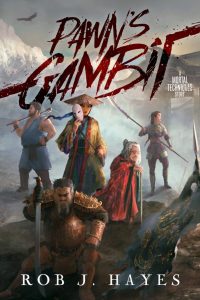Pawn’s Gambit by Rob J. Hayes – Book Review
And here’s the text-based review, for all of you who prefer the written word to the outrageous madness of editing and internet memes that is my video.
 I thoroughly enjoyed 2019’s standalone Never Die, an action-driven novel I described as an anime in novel form, chock-full as it was of brilliant combat inspired by Japanese myth, legend, folklore, and martial arts. Pawn’s Gambit, surprisingly not the prequel to hit Netflix show Queen’s Gambit, does everything I enjoyed in Never Die, and a whole lot more besides.
I thoroughly enjoyed 2019’s standalone Never Die, an action-driven novel I described as an anime in novel form, chock-full as it was of brilliant combat inspired by Japanese myth, legend, folklore, and martial arts. Pawn’s Gambit, surprisingly not the prequel to hit Netflix show Queen’s Gambit, does everything I enjoyed in Never Die, and a whole lot more besides.
Never Die 2: Die a Little Bit is, far and away, a more memorable book than its predecessor; and a better novel, I would argue. Its chief conceit is more engaging by far—a contest for the throne of heaven. Part gauntlet, part treasure hunt, this is a work that isn’t afraid to claim an identity of its own, similar yet very different from its predecessor. Take protagonist Yuu, who is hardly a fighter the likes of Never Die’s Whispering Blade. A strategist of both great renown and infamy, she is a drunk, full of self-pity for the person she used to be before, I quote, “war had made her a murderer, and before peace had made her a criminal.” Yuu is embroiled in the divine contest by Natsuko, goddess of lost opportunities, whose most common appearances include a small child and a tiny, wrinkled grandmother.
It’s the relationship between these two characters from which conflict is generated – Yuu is a most unwilling champion, pushed and prodded into her role by the insistent goddess. Yuu is a little like Batman in that old internet joke—give her enough prep time, and she’ll figure out how to deal with it. Trouble is, the artifact hunt Natsuko sends her on has a set time limit, and our protagonist is forced to improvise. Watching her figure her way through one tight spot after another is a highlight of this novel.
As for the goddess, Natsuko is amusing, a little frightening, constantly cantankerous. But she is wise, too; lines such as the following well exemplify that wisdom:
“Mistakes are like wrinkles…The older we get, the more we have, and we forget them until we look in a mirror,”
and
“There is a propensity to confuse heroism with rash action. They are not the same. A true hero acts not on impulse, but on rationale and consideration.”
Good lines, even if one of them comes from Art of War, Yuu, herself—but hey, it takes wisdom to recognize it in others.
Is it a rewarding experience, reading this while having read Never Die? I would argue so. I had a murky memory of Yuu’s character herself, but as I read on, I found elements from the first Mortal Techniques novel coming back to me—a welcome return, by the end of this one.
Support characters include a peasant with heroic aspirations, a thief, a yokai or two, and several murderous mortals with Techniques far deadlier than that of our inebriated protagonist. It’s all fun and games until someone named the Ticking Clock comes after you with a flying machine and bloody intent.
Impressive is the way in which Hayes handles the theme of domestic abuse – some of his subtlest work yet. Hints of something amiss are spread throughout, left for you to piece together as you read on, until a point when—snap—it all clicks.
The game of chess is used as a framing device to the novel. The prologue to the book opens with the goddess Natsuko literally picking a pawn in the gods’ contest; the opening proper of the book closes in on Yuu playing a literal game of chess; many of the conflicts in the book can be related to metaphorical chess games, to a greater or lesser extent. As far as framing goes, this is wildly successful and well-deserving of praise.
Unlike its predecessor in the Mortal Techniques, this one also left me eager to read the next title in this collection. Hayes has a talent in teasing out what’s to come; this is most evident in the epilogue, only a few short pages, which hints at a conflict to come in this world, and at a certain character with whom readers of either book (or both) should be well familiar with, to one extent or another.
It’s a very fine release, as I’ve come to expect of Rob J. Hayes. He continues to deliver captivating tales of deeply flawed heroes in a way that deserves recognition and acclaim, as well as my recommendation. Buy it, read it – I trust you’ll enjoy it.
